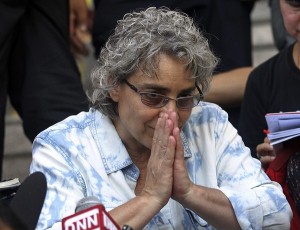
Elisabetta Polenghi, younger sister of Italian photographer Fabio Polenghi, gives a Thai way ‘Wai” to express thanks in front of Thai media in Bangkok, Thailand, on May 29, 2013, after the court had found that Polenghi, killed while covering the military’s crackdown on anti-government protesters in Thailand’s capital three years ago, was shot by a high-velocity bullet like those issued to soldiers. Journalism remains a dangerous profession, the World Association of Newspapers and News Publishers (WAN-Ifra) said Wednesday, June 5, 2013. AP PHOTO/SAKCHAI LALIT
BANGKOK—Journalism remains a dangerous profession with 54 media practitioners killed in the line of duty, including one from the Philippines, over the past year, the World Association of Newspapers and News Publishers (WAN-Ifra) said Wednesday.
“The safety of journalists continues to be a major concern in areas of the world where conflict makes reporting the news dangerous, often deadly,” said WAN-Ifra’s Global Press Freedom Report. The report covered the period June 2012 to May 2013.
WAN-Ifra’s recorded incident in the Philippines was the murder of commentator Julius Cauzo of radio station dwJJ in Cabanatuan City in Nueva Ecija province. Cauzo was shot dead on Nov. 8 last year.
Cauzo, WAN-Ifra noted, was critical of local politicians and had received death threats.
The group emphasized that “impunity remains a bitter issue in the Philippines.”
It said that investigations were “still ongoing into the Nov. 23, 2009, ‘Ampatuan massacre,’ which saw 32 journalists tragically killed.”
The New York-based Committee to Protect Journalists listed the Philippines as the third-most dangerous place for journalists with the unsolved killings of media men even after President Aquino vowed to end the murders.
WAN-Ifra said that of the media deaths, 15 were killed while covering the civil war in Syria while 10 died in Somalia.
“Whether at the hand of extremists, organized criminal gangs or official security forces, journalists increasingly find themselves in the firing line,” WAN-Ifra said.
“Where the media is targeted, impunity for the killers of journalists continues to prolong the agony for the victims’ families and cast a chilling shadow over the profession,” it added.
WAN-Ifra said its 47-page report noted that in many parts of the world, attempts to muzzle press freedom had gone in the form of criminal liabilities, soft censorship and “policing the digital debate,” where states had targeted social media users active in political debates.
Online freedom of expression has been targeted by authorities in China and Vietnam where bloggers have been under surveillance or sentenced to jail terms.
In Afghanistan and Pakistan, media are under attack from “violent extremists,” WAN-Ifra said.
The next WAN-Ifra congress will be held in Torino, Italy, on June 9-11 next year.

